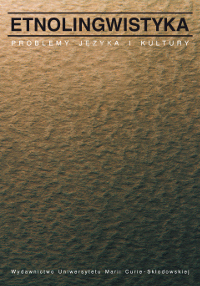FRANCUSKI PEUPLE I POLSKI LUD. DWA POJĘCIA — DWA PARADYGMATY JĘZYKOWO-KULTUROWE
THE FRENCH PEUPLE AND THE POLISII LUD: TWO LINGUISTIC-CULTURAL PARADIGMS
Author(s): Maciej Abramowicz, Jerzy BartmińskiSubject(s): Anthropology, Language studies, Language and Literature Studies, Applied Linguistics, Cognitive linguistics, Translation Studies
Published by: Wydawnictwo Naukowe Uniwersytetu Marii Curie-Sklodowskiej
Keywords: French peuple; Polish lud; nation; society; elites; authorities
Summary/Abstract: Firstly, the linguistic-cultural paradigm is defined as a social cognitive model. It constitutes the basis for language and is connected with the specificity of national culture. Then a contrastive analysis of key-words, the Polish lud and the French peuple is presented. It has been carried out according to the principles of anthropological linguistics, by establishing their semantic aspects (facets — fasety) and studying their realization. The analysis is focused on the meaning: “unprivileged social strata” because of its highest frequency in both languages and its historical and current ideological function. The material analyzed has been divided into two parts: the historical (up to the end of the 19th c.) and the present-day.There is a significant parallelism between the two languages: in both, the respective words are used by people from beyond and from above the community about which they talk. However, several divergencies have also been discovered. The reference of the two nouns is different: the Polish lud mainly designates peasantry, whereas the French people primarily refers to lower social strata, in particular to the urban proletariat. The aspectual structure of the two concepts is different as well. In peuple the dominant aspects are the material and the moral ones, whereas in lud the social and cultural aspects are the most prominent. Finally, the realization of facets is different: peuple is characterized by intellectual inferiority but a certain kind of wisdom is attributed to lud.The differences are responsible for different connotations and values which emerge from behind the concepts discussed, the Polish lud being more positive. They are also responsible for the different directions of their respective historical evolutions: the French peuple has become synonymous with nation, whereas the meaning of the Polish lud is closer to “society”, as opposed to the elite and the authorities.
Journal: Etnolingwistyka. Problemy Języka I Kultury
- Issue Year: 8/1996
- Issue No: 8
- Page Range: 41-56
- Page Count: 16
- Language: Polish

